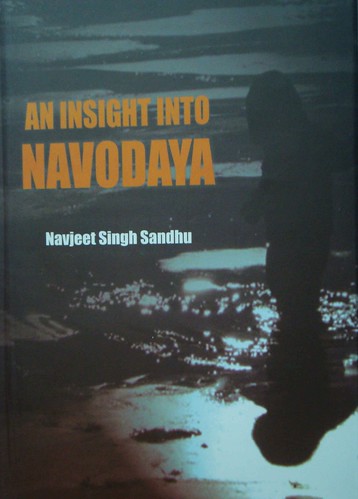
Just not another brick in the wall.
Suneet Singh Tuli is the brain behind the today's most versatile net surfing hand held device. He is the creator of the 'Pocket Surfer'.
Suneet is presently the CEO of the Datawind and is keen to bring the internet to the developing world at a very cheap rate but at very high speeds. He has also got his name in the Guinness Book of World Records for making the world's largest fax machine. He was born in India and migrated to Canada when he was just 11 and took civil engineering in the University or Toronto.
Oh! Sorry , I forgot to mention about his product -the fastest hand held internet surfing device. You would love to know about it. It would not be much better if you hear it in Suneet Singh's words. So just click play and increase your knowledge.
You will also come to know about the SPEED CHALLENGE in the video and lot more so just don't have a look alone but also watch it carefully.
If you are new to the device and don't know much about it -I mean it's features you can use to make your surfing experience enjoyable. You can watch the video below and also decide whether you would like to take the product.
Word of Caution: Now it's third version named PocketSurfer3 is also in the market so just don't go to the shop and ask for pocket surfer 2. Get the latest version and you will love it. After all it provides free internet facility for the whole life.
Now I would like to come back to the story of Suneet Singh Tull. Few months back I came across an article written by John O’Hanlon. I found the language and style very interesting so I think it's better I show you that instead of writing it here again.
Here it is:
Suneet Singh Tuli was only 11 and his brother Raja 16 when their civil engineer father, Lakhbir Tuli, left India. Lakhbir came from an entrepreneurial Sikh family and wanted to give his family the best opportunities he could. He did well; the boys flourished at high school and followed one another into the University of Toronto, Raja taking computer engineering and Suneet opting for civil engineering.
In the late 1980s the disruptive technology of the moment was the fax. It was possible to send a document from one end of the world to another in seconds, to the consternation of FedEx, UPS, DHL and other organizations that made their money by shipping documents. However the Tuli family knew only too well that faxes could only handle small format documents. A4 was fine but the drawings architects and civil engineers use, measuring feet across, still had to be couriered.
Lakhbir was delighted when his elder son, having graduated, turned his skill to developing a wide format fax machine.
“My brother didn’t have to go out and look for funding - he just had to convince my father that it was worth hiring a couple of people irrespective of whether he believed a product would ever be created,” explains Tuli.
That level of confidence certainly helped grow the innate entrepreneurial qualities of both boys, because as soon as he too had graduated Suneet joined Raja in the new firm WideCom.
With no manufacturing or marketing background the pragmatic brothers had to learn quickly. “Nobody wanted to buy a CAN$20,000 fax machine in pairs, because you had to have one at each end, from a couple of new graduates!” he recalls. “So I approached the problem laterally. You could call it a gimmick. I was able to get the Guinness Book of Records to recognize that this was the world’s largest fax machine. On the strength of that we generated around 600 articles over a period of six months. I got a local MP to stand up in the Canadian House of Commons to congratulate us and Fortune did an article in 1992.”
WideCom got a lot of free coverage on the back of the Guinness story and the orders started to come in. Experienced entrepreneurs will recognize the new problems that created.
“That coverage created a level of awareness that we could never have bought,” says Tuli, who had taken on the job of marketing the product.
The wide format fax was a timely innovation, but by the mid 90s, when the company floated on NASDAQ its initial success had attracted heavy hitting competitors like Xerox and the Japanese Katsuragawa.
Tuli recognizes that he made his first big mistakes as an entrepreneur at this period.
“The fax was killed by the internet. I wish I had seen that coming a little faster than I did. After we took our first company public we had an opportunity to sell it for a large sum to Xerox, which we passed up believing we could do better alone.”
But if he had done things differently, he says, he wouldn’t have learned the lessons he did. And, it might not have been so good anyway: “I could have taken CAN$50 million as a 25 year old and said ‘I’m done!’ who knows?”
As it was, he and his brother decided to address and explore broader markets and move out of the niche.
“In our second venture we went for portable peripherals. Our company DocuPort Inc made handheld scanners and battery operated handheld printers.”
By 1999 the Tuli brothers were excited by the possibilities of the wireless internet. All their experience lay in imaging hardware, not in the internet, but they were not going to be daunted and move on to venture number three.
INTERNET ON THE MOVE
By 1999 Suneet found that the internet had become such a part of his daily life that he rarely bought a newspaper. “I hadn’t talked to a travel agent in a few years by then!” he jokes. As a Sikh he even found that he could find the appointed prayers online and save the complications of traveling with a prayerbook.
“The idea that I could have all of that in the palm of my hand was very powerful.
“I went through a lot of frustration for a few months because nothing delivered the internet effectively. The first product I bought was horrible! There was a special writing scheme to learn, and the average page would take three to five minutes to load.”
He tried other products, each with the same result. That’s when Suneet Tuli thought back to the earlier venture.
“I knew 10 years earlier, on a 9600-baud modem, we could send a 3ft x 4ft engineering drawing from one end of the world to the other in less than 30 seconds. The problem was not the pictures but the complexity of the page. We took out 17 US patents covering our client/server technology.
“The bottom line is that the Datawind technology delivers all the look and functionality of a PC web page 30 times faster than it takes to load it on any other handheld.”
To make it stand out, though, Tuli realized that he had to find an attractive business model. He worked out that the volume of web traffic would be sufficient, and data costs low enough, to offer free internet access. And he looked back to the ruse he employed to get the fax product noticed – but, instead of the Guinness Book of Records, this time he offered the product free to anyone who could find a faster mobile internet device. This caught the attention of geeks and bloggers the world over, but was a no-risk ploy because it really is faster. They loved it and spread the word.
WORLD SCALING
Having successfully launched PocketSurfer2 in the UK, Germany and Spain, as well as Canada and the USA, Tuli is now looking at opportunities in India and other developing economies.
He is convinced that the combination of fast and free access to the ‘real’ internet will be a winner in these markets where the volume is so much greater, and the needs slightly different.
“The free access model is revolutionary in developing countries because most of the cost is in the screen and the wireless modem, both of which people already have if they have a TV and a mobile phone, we could drive the entry level cost down considerably.”
It took India 100 years to get 30 million landlines; it took only five years to get 300 million mobile phones.
80 percent of families have one, he points out, but there are still fewer than 10 million internet-enabled computers in the whole country. “Just imagine how powerful it would be if the same number of Indian homes had internet.”
Tuli’s vision for India has a strong social dimension but sits better with the model being put forward by Sam Pitroda and the Knowledge Commission than with Nicholas Negroponte’s OLPC (one laptop per child) project’. “The product needs to be low cost, but it also should make commercial sense. People think I am mad when they see me talking to rickshaw wallahs and trying to figure out how to sell them devices at a price they can afford and in the way they want to use them! But the internet is too expensive for the average person in India.
“If we could bring the cost of access down to western levels, usage would increase massively. I want to bring the cost down to a week or two of salary, and make usage free for the average user.”
Tuli will launch in both India and China before the end of 2008. He has also done a deal with a distributor in Nigeria, the richest and most populous of African nations.
Ironically, the one market where he hasn’t yet been able to launch the free access model is the US.
As a serial entrepreneur, he is constantly on the lookout for new challenges and is currently very excited by the potential of low cost solar power to change lives in developing countries. “Why is it difficult or expensive to build a solar panel fab in India?” he asks. “The cost of oil is creating such huge opportunities round the world. I truly believe that every 10 or 12 years we are going to see significant changes that make us wonder how we ever did without that!”
Tuli seems to be the very exemplar of a good entrepreneur, having in equal parts a reliable commercial instinct, the humility to learn from his mistakes, an almost boyish curiosity and a rooted world view that compels him to make life better for people.
Sunday, February 15, 2009
Suneet Singh Tuli -Making internet easier and faster
Subscribe to:
Post Comments (Atom)







3 comments:
i want to promote the pocket surfer in each corner of india by my idealse help meogy,plea
Excellent blog here! Also your site loads up fast! What host are you using?
Can I get your affiliate link to your host?
I wish my site loaded up as fast as yours lol
Also visit my page Mobile Computer Repair
My site > Mobile Computer Repair
Because the admin of this web site is working, no doubt very soon it will be renowned,
due to its quality contents.
Feel free to surf to my web site; barcode scanner rental
Post a Comment